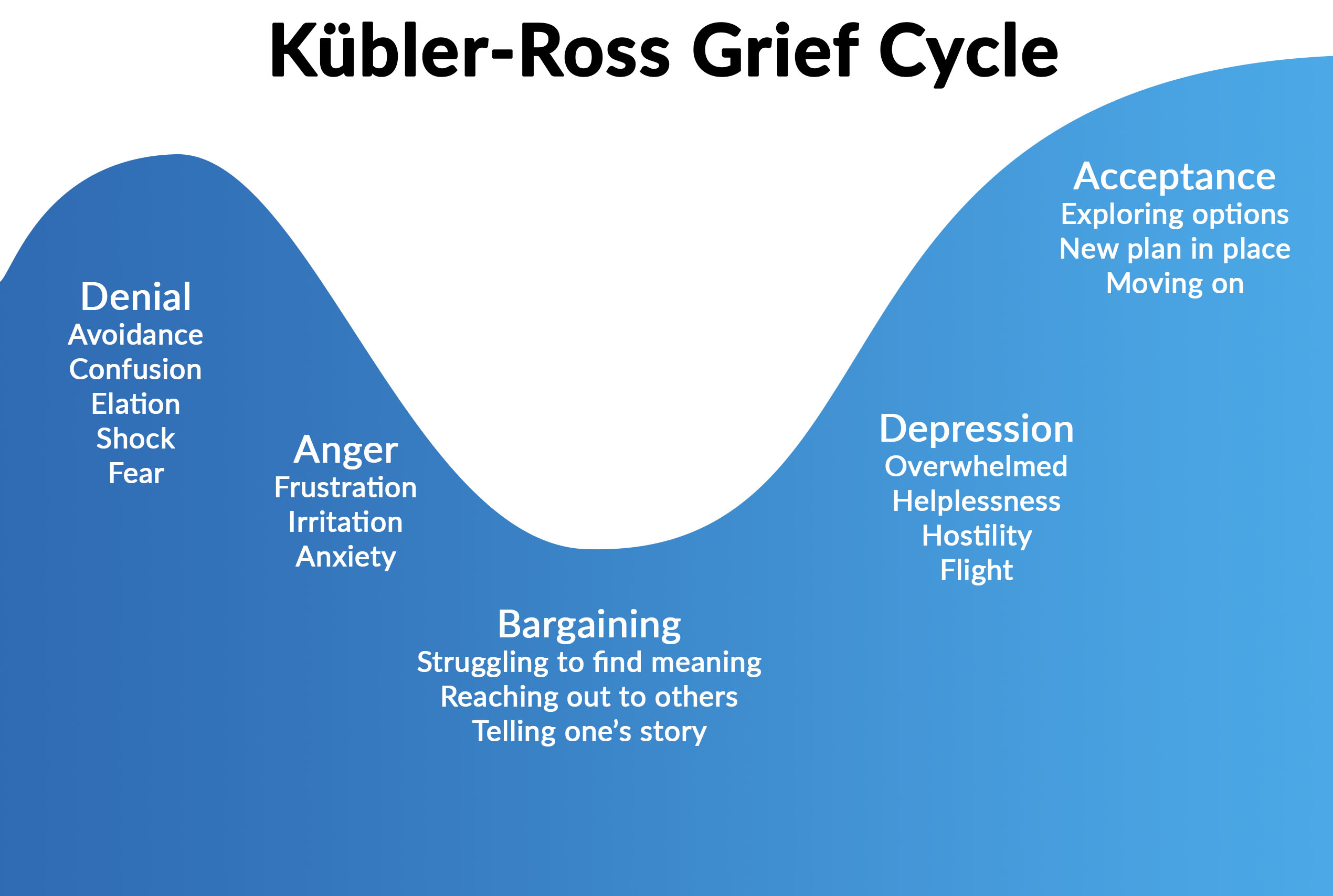833-WCC 4 YOU (833-922-4968) is a telephonic counseling service that connects students with a licensed mental health provider, 24/7. The licensed mental health providers are available to assist with numerous concerns including, panic, suicidal thoughts, rumination/worry, referral assistance, and general support. These services are available to you as a student at no additional cost.
You may have stumbled upon this page or perhaps you were sent this link from a caring instructor. Please know that WCC cares and we are here to help. If you have lost a loved one, please accept our deepest condolences. Grief and loss impact us all differently. There is not a timeline of when someone “should” stop grieving. There also is not a limit as to what someone can grieve over. Grief and loss can include the passing of a family pet, the loss of a job, divorce, friendship/relationship conflict, and many more.
You may already be familiar with the 5 stages of grief. This was developed by Elisabeth Kübler-Ross, a psychiatrist who worked with terminally ill patients. Many people often think that the 5 stages of grief are linear and meant to be completed in order. However, the process of grief is unique for everyone and many people may not experience all 5 stages. Some people may experience all 5 stages and cycle back through revisiting particular stages. Below you can see the “typical” arc of the grief cycle with all 5 stages represented; Denial, Anger, Bargaining, Depression, and finally Acceptance.

Kubler-Ross, Doctors and the 7 day NHS | Oxford Medical Training (medicalinterviewsuk.co.uk)
We know that there is not one specific thing that can take away the pain we may feel as we go through the grief process. However, there are things we can do to help ease some of the pain of grief by seeking out internal and external support. Below are some simple suggestions that we have found helpful.
- Prioritize self-care (exercise, nutrition, sleep)
- Take time to understand your grief: Review the Mourner’s bill of rights
- Stay connected with others: Talk with trusted friends, consider grief support groups or counseling
- Acknowledge your grief in a non-judgmental way: Practice mindfulness meditation
- Find a way to express your grief: Journal about your feelings
Resources for Grief
Personal Counseling at WCC for students enrolled in the current semester.
Coming Back, a grief and loss focused podcast.
Grieve Well is a non-profit organization that is dedicated to supporting those who may be grieving. They offer support groups and various resources to assist those who are affected by loss.
Grief Share offers support groups.
In crisis? Call or text the National Suicide Prevention Lifeline
- Hotline: 988, press 1 for Veterans
- Or text HOME to 741741
- Or text STEVE to 741741 for access to a culturally trained couselor
Want to learn more or get involved?
- American Foundation for Suicide Prevention
- Suicide Prevention Resource Center
- Centers for Disease Control
- WCC Personal Counseling offers QPR (Question, Persuade, Refer) Training on campus - call (734) 677-5223 to learn more
WellTrack Boost is an app designed to help you understand your mental health and to provide you with help to improve your mental health wellness. WellTrack Boost is a suite of online tools and courses that uses aspects of Cognitive Behavioral Therapy to help you identify, understand and address issues that you are having. WellTrack uses these five steps to address your needs:
- Wellness Assessment – the Wellness Assessment will help you understand and track your levels of stress, anxiety and depression. Awareness of how your mental health changes over time will help you keep things in check.
- Self-help for mental health wellness
- WellTrack Tools including guided relaxation exercises
- Track your progress
- Maintain your mental health
Mind Your Mental Health is an online newsletter written by WCC Personal Counselors covering a wide range of topics that affect WCC students.
Mental Health Screenings: Are you wondering if what you’re experiencing is a symptom of a mental health condition? Take a screening and follow the guidance provided for seeking help.
On Campus
Student Resource Center
Student Center, 2nd Floor, Rm. 206
(734) 677-5015
Off Campus
Housing Access for Washtenaw County (HAWC)
(734) 961-1999
Food Gatherers
Connect those in need to local food pantries
(734) 930-0550
Catholic Charities
815 Taylor St., Ann Arbor, MI 48105
(734) 662-4462
Contact
Student Center, SC 206734-677-5223
833-WCC-4-YOU (833-922-4968)
(after hours)
Hours
Mon - Thu: 8 a.m. - 6 p.m.Fri: 8 a.m. - 5 p.m.
